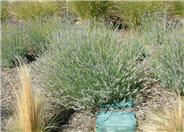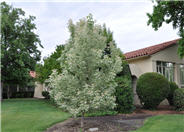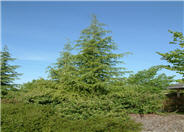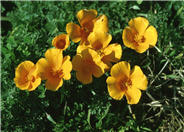
Common name:Monarch Blanket Flower
Botanical name:Gaillardia X grandiflora 'Monarch'
Gaillardia gra. 'Monarch' is a perennial. Grows to 2'-4' high, 1.5' wide, with roughish grey-green foliage and single or double mixed red and yellow bicolor blooms 3"-4" across. Exceptionally long bloom. Keep dead-heading and they'll bloom til frost.

Common name:Grosso Hedge Lavender
Botanical name:Lavandula X intermedia 'Grosso'
Long-stemmed Lavender has beautiful violet-colored plumes in the summer. Very drought tolerant and it is a great plant to create that Mediterranean effect.

Common name:Common Foxglove
Botanical name:Digitalis purpurea
This biennial Foxglove will reach 3'-4' tall when blooming in the early summer. The large spire of huge, bell-shaped flowers ranges from purple to pink to cream with purple specks. Large, textured leaves form an attractive rosette until bloom time. This plant likes a moist, filtered-sun area similar to the Lobelias and Columbines. -Holland Wildflower Farm

Common name:Flamingo Box Elder
Botanical name:Acer negundo 'Flamingo'
This deciduous tree can rapidly reach 30'-35' high and wide. The leaves have 3 to 5 lobes, white & green variegation with hints of pink. Foliage turns gold in fall. Blooms are inconspicuous. "Flamingo' prefers regular watering and more during hot summer months. It prefers full to part sun with well draining soil. Fertilize in spring. Prune in winter.

Common name:Deodar Cedar
Botanical name:Cedrus deodara
This fast-growing, coniferous evergreen is capable of reaching a size of 80' high by 40' wide. Its needles are a light, silvery green color, 2" long. Flowers are inconspicuous. Barrel shaped cones appear in fall and winter. Branches are pendulous and spreadings. Plant in area that has ample room for growth.

Common name:California or Golden Poppy
Botanical name:Eschscholzia californica
This small annual (sometimes acts as a perennial) plant will grow to less than 1' tall and has light, small blue-green leaves with gold and orange flowers that bloom in spring and summer.
| Designer: Susan Stiltz | Islands of Planting Beds |
Photographer: GardenSoft |
Soils and Compost:
Incorporate compost 6" into your soil to retain water, reduce compaction, feed earthworms, and provide valuable nutrients to your plants.
Water Saving Tip:
Check the soil's moisture level before watering.
You can reduce your water use 20-50% by regularly checking the soil before watering.
Integrated Pest Management:
Develop healthy soil for plants that are vigorous and naturally pest-resistant.
